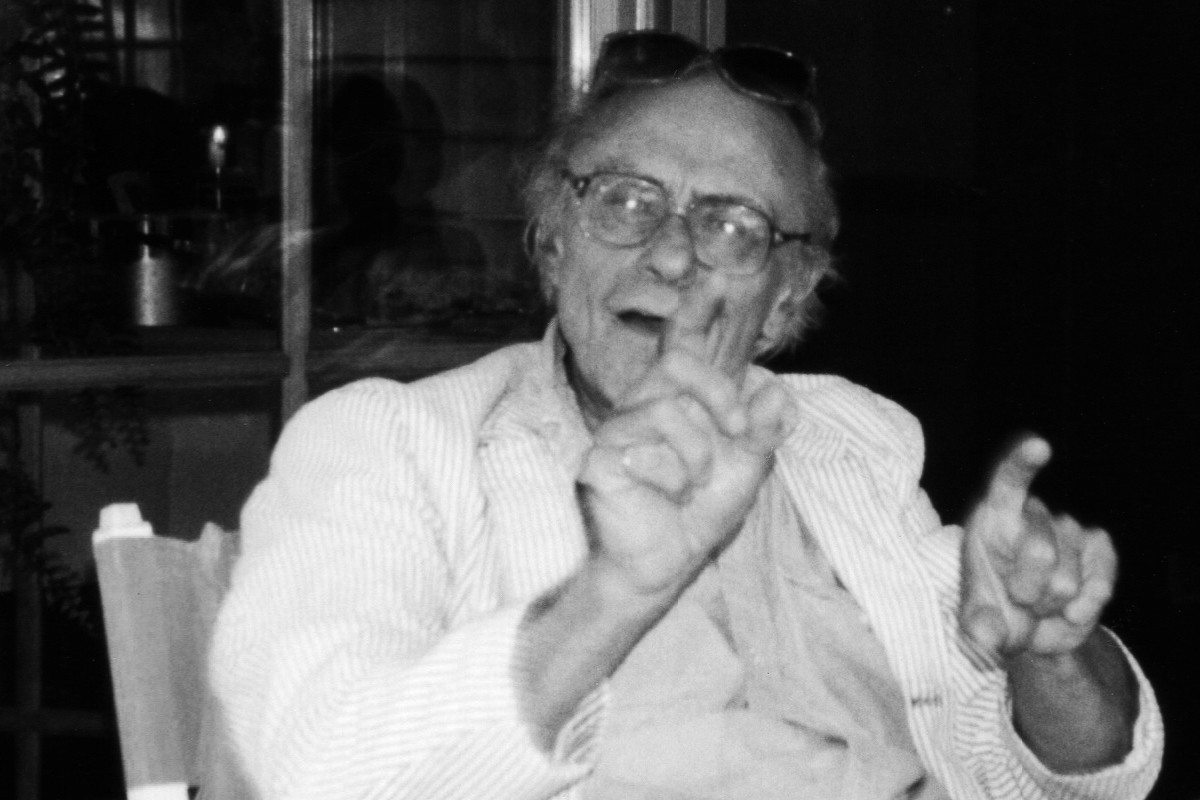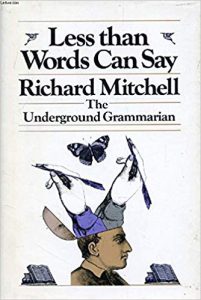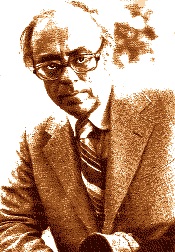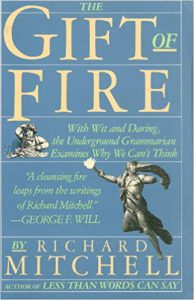Education
How the 'Underground Grammarian' Taught Me to Tell Reason from Rubbish
Clear language engenders clear thought, and clear thought is the most important benefit of education.

Thought control, like birth control, is best undertaken as long as possible before the fact. Many grown-ups will obstinately persist, if only now and then, in composing small strings of sentences in their heads and achieving at least a momentary logic. This probably cannot be prevented, but we have learned how to minimize its consequences by arranging that such grown-ups will be unable to pursue that logic very far.
~Richard Mitchell, Less Than Words Can Say
In January of 1977, New Jersey’s Glassboro State College (now Rowan University) saw the publication of a new campus journal. Sporting handset type and quaint nineteenth century line-drawn imagery, it was called the Underground Grammarian. On the front page of the first edition of the four page newsletter, the anonymous editor printed its “Editorial Policies”:
The Underground Grammarian is an unauthorised journal devoted to the protection of the Mother Tongue at Glassboro State College. Our language can be written and even spoken correctly, even beautifully. We do not demand beauty, but bad English cannot be excused or tolerated in a college. The Underground Grammarian will expose and even ridicule examples of jargon, faulty syntax, redundancy, needless neologism, and any other kind of outrage against English.
Clear language engenders clear thought, and clear thought is the most important benefit of education. We are neither peddlers nor politicians that we should prosper by that use of language which carries the least meaning. We cannot honorably accept the wages, confidence, or licensure of the citizens who employ us as we darken counsel by words without understanding. And so, to the whole college community, to students, to teachers, and to administrators of every degree, the Underground Grammarian gives

The newsletter’s self-declared “Wandering Scholar” provided examples and corrections. On the final page, he offered subscription information:
There are no subscriptions. We don’t lack money, and we may attack you in the next issue. No one is safe.
We will print no letters to the editor. We will give no space to opposing points of views. They are wrong. The Underground Grammarian is at war and will give the enemy nothing but battle.
Nine issues of the Underground Grammarian were published that first year. In issue four, the author provided a P.O. Box for letters, queries, and brief comments on grammatical matters. “Horrible examples gratefully accepted.” Issue eight revealed that a member of the staff, one R. Mitchell, “has been promoted to the post of Assistant Circulation Manager.”
Thus began a 15-year odyssey by an initially obscure professor of English, Richard Mitchell, one of the great and forgotten metaphysical minds of the twentieth century. He was the man who awoke me to the idea that, even though I was a published writer with a B.A. in English, I had yet to learn how to tell reason from rubbish.
* * *
Richard Mitchell conceived his historic newsletter the year I entered college. Born in Brooklyn in 1929, Mitchell spent his early years in Scarsdale, New York. He met his wife Francis while briefly attending the University of Chicago. He graduated Phi Beta Kappa from the University of the South and earned his Ph.D. at Syracuse University. After teaching college English in Defiance, Ohio, he became a professor of English (later of Classics) at Glassboro in 1963.
Almost 20 years later, the failure of my secondary education became apparent in a university Spanish class during which, for the first time I could recall, I learned about prepositions. In the mid-1970s, I was a straight-A high school sophomore elevated into Honors History and Honors English. In history, we learned about neither American history nor Western civilization, but rather about the Bantus of South Africa, a noble study. In English, we did not learn much about writing and grammar, and were instead left to be our open and creative selves. Nearly all of my bored fellow honors students indulged in pot, mescaline, and speed.
My Spanish class experience made me angry. I felt cheated. I had started community college studying computer programming. After publishing an article in a computing magazine, I transferred to a four year university with the assumption an English degree was my ticket to becoming a professional writer. I was right. But, more importantly, that shift had taken me from my science and math roots into the world of Shakespeare and Austen, Socrates and Augustine. I perceived a glimmer of what it meant to have a classical liberal education.

My first upper division English class shocked me when a dinosaur English professor, Dr. David Bell—a professor in Richard Mitchell’s mold, but not yet a curmudgeon—gave me my first C on a paper, busting my A-student self-image. That wake-up call helped me to see that, although I was published, I had much to learn about writing. Worse, in my first graduate course, Bell’s “Austen and Bronte,” I discovered that I had much to learn about reading, and that I lacked the acuity to appreciate Jane Austen’s clear, witty, and precise prose.
Not long before, I’d read Richard Mitchell’s first book, Less Than Words Can Say. I don’t recall how I stumbled upon him. I’d probably read some opinion column that referred to his work. In a publication announcement in the Underground Grammarian, Mitchell described it as “a melancholy meditation on the dismal consequences of the new illiteracy.”
He had wanted to title the book The Worm in the Brain, pointing to the dangers of administrative rhetoric. The publisher rejected that title as “too frightening and grisly,” But I knew I had found a fellow traveler when I read his Foreword:
Words never fail. We hear them, we read them; they enter into the mind and become part of us for as long as we shall live. Who speaks reason to his fellow men bestows it upon them. Who mouths inanity disorders thought for all who listen. There must be some minimum allowable dose of inanity beyond which the mind cannot remain reasonable. Irrationality, like buried chemical waste, sooner or later must seep into all the tissues of thought.
With that prophetic book, I first experienced the “cleansing fire [that] leaps from the writings of Richard Mitchell,” as George F. Will later described it.
Mitchell did title the first chapter “The Worm in the Brain,” in which he told the story of a colleague who would send him a note whenever there was some committee meeting. At first the note read something like, “Let’s meet next Monday at two o’clock, OK?” But when he aspired to become assistant dean pro tem, the simple, perfect prose changed. “This is to inform you that there will be a meeting next Monday at 2:00.” After achieving that appointment, the note read, “You are hereby informed that the committee on Memorial Plaques will meet on Monday at 2:00.” The worm in the brain had done its work.
I began to notice the worm in the brain during my everyday interactions with friends and colleagues at the university, especially the English professors. It often took the form of a label which created an image in the brain that prevented thought. One such professor, smart and engaging, returned a paper analyzing a passage in the U.S. Constitution. She gave the paper an A, but added, “I can’t help but feel that your argument is wrong, although I can’t explain why. I showed it to my husband, and he thought that it was a conservative argument.”
That statement invalidated the A, and I experienced my first taste of how subtly an abstract label can paralyze an otherwise thoughtful mind. Years later, while teaching at a business college, I saw a more pronounced form of the same phenomena. During a Business English class, I chatted with a bright student who volunteered for the NAACP. We would discuss all kinds of interesting topics, such as the similarities and differences between Martin Luther King and Malcolm X.
That is, until I noticed a change. She had stopped talking to me like a fellow human being and started talking at me like a white male. I stopped her and asked if she noticed what she had just done. She hadn’t, so I pointed out that she had shifted from talking to me to talking to an image inside her head. I told her that I would hold my hand up and block my face every time she did it. As the conversation proceeded, and I raised my hand, lowered it, and then raised it again, she became aware of the worm in her brain, a mental-emotional implant that prevented her from treating me as a colleague when certain topics were engaged.
Her implant was creating rubbish, of course, but it was insidious by nature because it disguised itself as something in the real world. Worms in the brain are like that.
* * *

My university library subscribed to the Underground Grammarian, and I quickly caught up with the first nine years of its 15 year run. In its second issue, Mitchell clarified the newsletter’s goal: “The Underground Grammarian does not seek to educate anyone. We intend rather to ridicule, humiliate, and infuriate those who abuse our language not so that they will do better but so that they will stop using language entirely or at least go away.”
For the first eight years, Mitchell used a Chandler & Price rattle-and-clank printing press that was over 70 years old and required the time consuming use of hand-set type. In year nine, he discovered the Macintosh computer and desktop publishing. While admitting that the transition was painful and that he would miss the taste of lead, he decided that “Our proper business is to get this thing out, and not to preserve a fine and ancient craft.”
The newsletter proved popular enough that his publisher Little, Brown, and Company released a collection titled, The Leaning Tower of Babel and other affronts from the UNDERGROUND GRAMMARIAN. One of my favorite essays in the collection, entitled “The Answering of Kautski,” begins:
Tyranny is always and everywhere the same, while freedom is always various. The well and truly enslaved are dependable; we know what they will say and think and do. The free are quirky. Tyrannies may be overt and violent or covert and insidious, but they all require the same thing, a subject population in which the power of the word is dulled and, thus, the power of thought occluded and the power of deed brought low.
Mitchell went on to discuss Vladimir Lenin’s views on education, logical thought, and his contempt for people, and how the educationists of his day were witting and unwitting agents of that tyranny.
Having read everything Mitchell published, I recognized my growing sensitivity to academic and media thoughtlessness. I grew queasy at how pervasive vague and meaningless language had become among professors, fellow students, the media, self-serving public servants, and especially professional educationists. A fellow graduate student who had started a teacher training program to be a high school teacher reported back on the thoroughly insane postmodernist requirements of the curriculum. However, he confessed that he was going to keep his head down and complete the program without resistance.
What educationists were doing to education was the topic of Mitchell’s 1981 book, The Graves of Academe. The infiltration of inanity into the public schools had already struck Mitchell’s disemboweling spirit: “Clear language,” he wrote, “engenders clear thought, and clear thought is the most important benefit of education.” He continued:
Schools do not fail. They succeed. Children always learn in school. Always and every day. When their rare and tiny compositions are “rated holistically” without regard for separate “aspects” like spelling, punctuation, capitalization, or even organization, they learn. They learn that mistakes bring no consequences.
After sober and judicious consideration, and weighing one thing against another in the interests of reasonable compromise, H. L. Mencken concluded that a startling and dramatic improvement in American education required only that we hang all the professors and burn down the schools. His uncharacteristically moderate proposal was not adopted.
The question for me after reading The Graves of Academe was this: Was anyone not already on board persuaded to take action? Was Mitchell’s just another voice in the wilderness?

Mitchell’s greatest achievement was his 1987 book The Gift of Fire. In the Introduction, he reviewed his role as satirist and the “ancient and honorable task” of the “castigation of fools.” But something had changed. Now he pondered doing good, and the extent to which he knew what the good was. Although he had heard about doing good, he realized that he had not known it. “True education is not knowing about, it is knowing.”
I decided as a Teaching Assistant to use this book as the reader in my English 1A Freshman Composition course. My aim was simple. Students embarking on a four year education might find value in thinking about precisely what kind of education options they had. Are they there for the grades alone? The partying? Are they willing to ponder the difference between a liberal education and vocational training, which Mortimer Adler aptly described as that between “the education of free men” and “the education of workers and slaves”?
The Gift of Fire is full of wisdom:
Who first called Reason sweet, I don’t know. I suspect that he was a man with very few responsibilities, no children to rear, and no payroll to meet.
and
If you should prefer to understand that children are those human beings who have not yet found the grasp of their own minds, then the task you have given yourself, that task of rearing a child wisely and well, is suddenly transformed from indoctrination to education, in its truest sense, and made not only possible but even likely—provided, to be sure, one little prerequisite, which is that you are not a child, that you have come into the grasp of your mind.
and
Here is a truth that most teachers will not tell you, even if they know it: Good training is a continual friend and a solace; it helps you now, and assures you of help in the future. Good education is a continual pain in the neck, and assures you always of more of the same.
The Gift of Fire highlights Socrates, Epictetus, and Jesus as role models for true education. The final chapter, “How to Live (I think),” is a reflection on how each of us is always in a state of becoming. As such, Mitchell cannot tell anyone How to Live. He can, however, set out what he believes to be the “largest and simplest definition of a true education… It is all that is absent in the lives of those who aren’t composing How to Live (I think).”
The book inspired me to find new ways of challenging my Freshman English students. I devised an exercise to answer the question, “If the government were to offer you millions of dollars on the condition that you give up access to all history and the arts before 1960, would you accept?” Students who chose not to take the money would stand on one side of the room. Those who chose to take it would stand on the other. The undecided would sit in the middle as the rest would try to persuade them to come to their side.
The students were evenly divided, with only a handful in the middle. I’ll never forget one young man who struggled with the class, his writing barely passable. He sat in the middle with a serious look on his face, while students around him had fun trying to persuade him to take their side. At one point he looked up at me and said, “This is really important, isn’t it?” I responded, “It’s probably one of the most important decisions you will ever make.”

* * *
In 1996, I received an email from Richard Mitchell, five years after he had closed the Underground Grammarian. It read simply, “What are you doing?”
The year before I had created the Underground Grammarian website, using optical recognition software to scan his out-of-print books and make them freely available online. I called it an “Unauthorized Site Dedicated to the Preservation of the Works of Richard Mitchell.” It was while I was uploading the newsletters I had, and requesting missing issues from other readers, that I received Mitchell’s email. He had already given permission to copy or plagiarize his writings in one of the newsletters. But did that extend to his books?
Happy but horrified by this first contact, I explained that I wanted to make his works freely available to teachers and anyone else who wanted to enjoy them. But, if he preferred, I would remove the entire site. I did request donations from readers to help keep the site alive, but no donations were required to enjoy free access to the site’s content. He replied that he was fine with the work I had done, just as long as I kept it freely available. I breathed a sigh of relief, and we embarked on an occasional correspondence.
In one email, I told him about how I used The Gift of Fire in class, and mentioned the exercise I conducted and the young man who had asked about the importance of his decision. Mitchell responded, “You succeeded in creating an occasion for education.” This was a description he had used in The Gift of Fire.
I cannot say that Mitchell taught me reason from rubbish. More accurately, from his lucid writing I caught the ability to tell reason from rubbish. I learned that he, as well as Dr. Bell, among others, burned with a cleansing fire that cleared away some of the dross within me. I learned that great teachers create an environment where true education is caught, not taught—the occasion of education—and that we now live in a world with fewer and fewer great teachers.
* * *
Richard Mitchell died at his home on December 27, 2002. A memorial was held at the university where he had taught all his life. I published a call for stories from readers who knew Richard Mitchell to post on the site, and the messages I received are a testament to the affection with which he is remembered and the influence he had upon those his writing touched.
Today, in a world awash with emotional reactiveness and churlish rubbish that crowds out precious reflection and reasoned conversation, I ache for the wry humor and penetrating insights of the man who ended his life so far above ground—Professor Richard Mitchell, the one and only Underground Grammarian.






